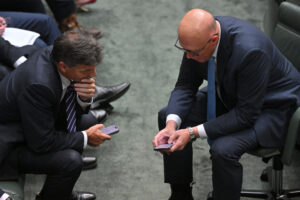What history teaches us about a boom

The policy agenda of the late-70s was to make room for the resources industries. A construction boom fuelled by foreign investment accompanied the mining boom causing an increase in the value of the Australian dollar and threatened manufacturing and other import competing industries. Nevertheless the mining boom looked set to maintain prosperity into the indefinite future. Soon however, the mining boom evaporated leaving a recession during which unemployment went from around five per cent in 1980 to 10.3 per cent in May 1983.
Back to this budget, and despite the mining boom exports are only expected to grow at four to 4.5 per cent in the forecast period. However, when commodity prices are so high exports do not need to be that strong to still harm other parts of the economy. Instead, what has happened is that the foreign investment associated with the boom has driven up the exchange rate which in turn has hurt other industries.
There has been a massive increase in imports at the expense of Australian production which is estimated to grow over 10 per cent in 2011-12 and 2012-13. One consequence is that the current account deficit on the balance of payments is estimated to rise to 4.75 per cent in 2012-13 and six per cent by 2013-14. Most Australians would be very surprised to learn that Australia will be spending much more abroad than it receives despite Chinese demand, high commodity prices and the mining boom.
Between the Lines Newsletter
The biggest stories and the best analysis from the team at the Australia Institute, delivered to your inbox every fortnight.
You might also like
When it comes to our relationship with Trump, it would be foolish to not heed the lessons of history
Australia has always had influence and power, it has just been too cowed to use it.
Trump’s Gaza Grab | Between the Lines
The Wrap with Amy Remeikis On September 30, 1938 British Prime Minister Neville Chamberlain stood outside 10 Downing Street and declared the Munich Agreement had appeased German Chancellor Adolf Hitler’s territorial aims. “I believe it is peace for our time,” he said. “…Go home and get a nice quiet sleep.” Germany violated the agreement almost immediately.
The Liberal Party defies its own history on tax
For decades, the Liberal Party has prided itself on being the “party of lower taxes”.


